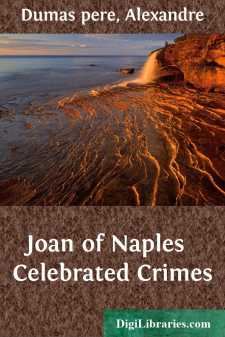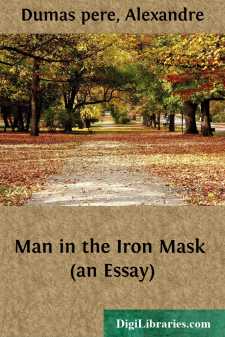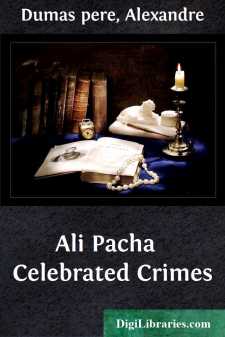Categories
- Antiques & Collectibles 13
- Architecture 36
- Art 48
- Bibles 22
- Biography & Autobiography 813
- Body, Mind & Spirit 138
- Business & Economics 28
- Children's Books 12
- Children's Fiction 9
- Computers 4
- Cooking 94
- Crafts & Hobbies 4
- Drama 346
- Education 46
- Family & Relationships 57
- Fiction 11821
- Games 19
- Gardening 17
- Health & Fitness 34
- History 1377
- House & Home 1
- Humor 147
- Juvenile Fiction 1873
- Juvenile Nonfiction 202
- Language Arts & Disciplines 88
- Law 16
- Literary Collections 686
- Literary Criticism 179
- Mathematics 13
- Medical 41
- Music 40
- Nature 179
- Non-Classifiable 1768
- Performing Arts 7
- Periodicals 1453
- Philosophy 64
- Photography 2
- Poetry 896
- Political Science 203
- Psychology 42
- Reference 154
- Religion 505
- Science 126
- Self-Help 81
- Social Science 81
- Sports & Recreation 34
- Study Aids 3
- Technology & Engineering 59
- Transportation 23
- Travel 463
- True Crime 29
Alexandre Dumas pere
Alexandre Dumas was a prolific French writer best known for his historical adventure novels, including "The Three Musketeers" and "The Count of Monte Cristo." Born in 1802, he was the son of Thomas-Alexandre Dumas, a mixed-race general in Revolutionary France. Dumas's works are celebrated for their fast-paced narratives, vivid characters, and intricate plots, making him one of the most widely read French authors in the world.
Author's Books:
Sort by:
Chapter 1. Marseilles—The Arrival. On the 24th of February, 1815, the look-out at Notre-Dame de la Garde signalled the three-master, the Pharaon from Smyrna, Trieste, and Naples. As usual, a pilot put off immediately, and rounding the Chateau d'If, got on board the vessel between Cape Morgion and Rion island. Immediately, and according to custom, the ramparts of Fort Saint-Jean were covered with...
more...
Should you ever go to Rome and visit the villa Pamphili, no doubt, after having sought under its tall pines and along its canals the shade and freshness so rare in the capital of the Christian world, you will descend towards the Janiculum Hill by a charming road, in the middle of which you will find the Pauline fountain. Having passed this monument, and having lingered a moment on the terrace of the...
more...
CHAPTER I In the night of the 15th of January 1343, while the inhabitants of Naples lay wrapped in peaceful slumber, they were suddenly awakened by the bells of the three hundred churches that this thrice blessed capital contains. In the midst of the disturbance caused by so rude a call the first thought in the mind of all was that the town was on fire, or that the army of some enemy had mysteriously...
more...
About the end of the year 1639, a troop of horsemen arrived, towards midday, in a little village at the northern extremity of the province of Auvergne, from the direction of Paris. The country folk assembled at the noise, and found it to proceed from the provost of the mounted police and his men. The heat was excessive, the horses were bathed in sweat, the horsemen covered with dust, and the party...
more...
We are sometimes astonished at the striking resemblance existing between two persons who are absolute strangers to each other, but in fact it is the opposite which ought to surprise us. Indeed, why should we not rather admire a Creative Power so infinite in its variety that it never ceases to produce entirely different combinations with precisely the same elements? The more one considers this...
more...
I—TOULON On the 18th June, 1815, at the very moment when the destiny of Europe was being decided at Waterloo, a man dressed like a beggar was silently following the road from Toulon to Marseilles. Arrived at the entrance of the Gorge of Ollioulles, he halted on a little eminence from which he could see all the surrounding country; then either because he had reached the end of his journey, or because,...
more...
For nearly one hundred years this curious problem has exercised the imagination of writers of fiction—and of drama, and the patience of the learned in history. No subject is more obscure and elusive, and none more attractive to the general mind. It is a legend to the meaning of which none can find the key and yet in which everyone believes. Involuntarily we feel pity at the thought of that long...
more...
If our readers, tempted by the Italian proverb about seeing Naples and then dying, were to ask us what is the most favourable moment for visiting the enchanted city, we should advise them to land at the mole, or at Mergellina, on a fine summer day and at the hour when some solemn procession is moving out of the cathedral. Nothing can give an idea of the profound and simple-hearted emotion of this...
more...
CHAPTER I The beginning of the nineteenth century was a time of audacious enterprises and strange vicissitudes of fortune. Whilst Western Europe in turn submitted and struggled against a sub-lieutenant who made himself an emperor, who at his pleasure made kings and destroyed kingdoms, the ancient eastern part of the Continent, like mummies which preserve but the semblance of life, was gradually...
more...
PROLOGUE On the 8th of April, 1492, in a bedroom of the Carneggi Palace, about three miles from Florence, were three men grouped about a bed whereon a fourth lay dying. The first of these three men, sitting at the foot of the bed, and half hidden, that he might conceal his tears, in the gold-brocaded curtains, was Ermolao Barbaro, author of the treatise 'On Celibacy', and of 'Studies in...
more...











